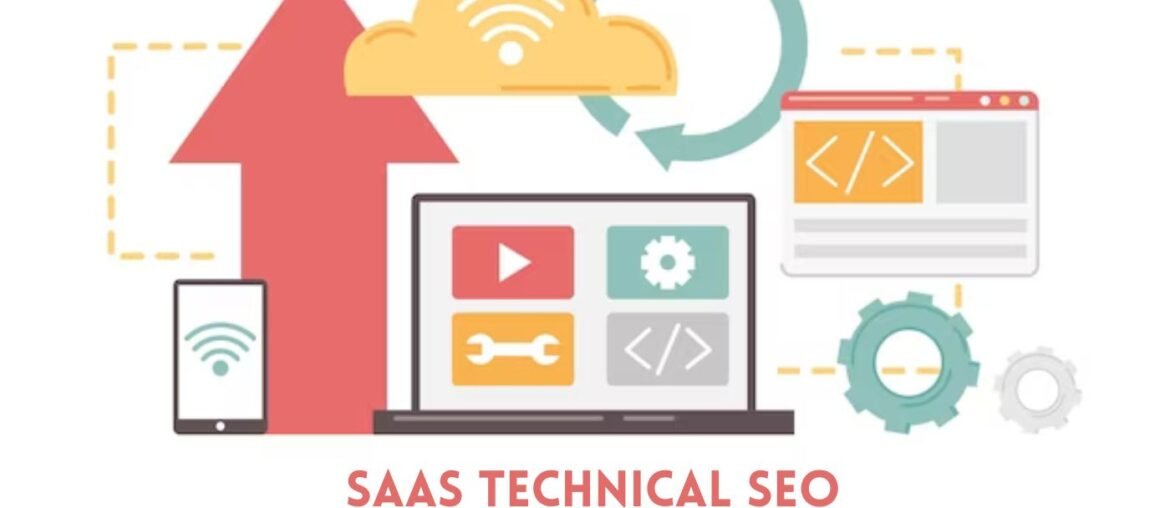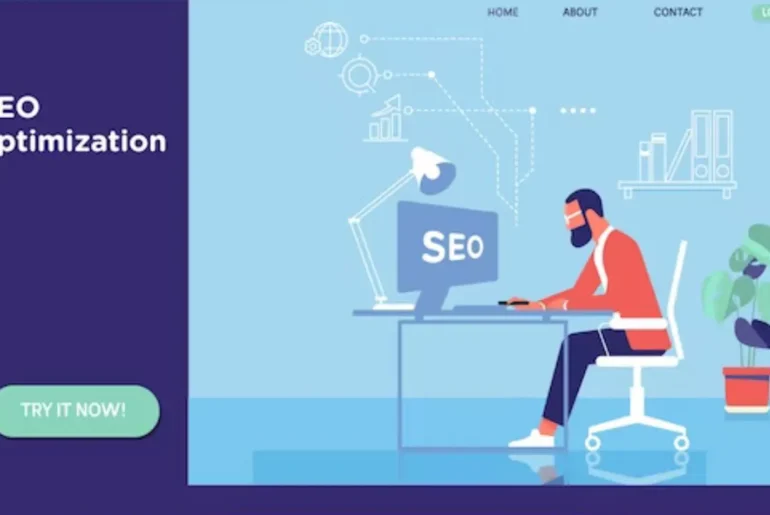Businesses rely on SaaS systems for a variety of services in this digital age, including customer relationship management and project management. But creating an outstanding SaaS platform is only the first step. You have to become an expert in Saas Technical SEO if you want it to stand out in the competitive internet industry.
"From code to conversions, how SaaS Technical SEO fuels your journey."
In this article , we will completely discuss about SAAS, its Technical SEO, its importance and how it is done. So Let’s start.
What is SAAS?
The term SaaS refers to “Software as a Service.” It’s a cloud computing model which requires a subscriptions for online software application access. Users don’t have to install or maintain the software on their servers or local devices while using this model. Alternatively, they can utilize a web browser to access and use the software. SaaS applications are hosted and managed by third-party service providers, which handle tasks like software updates, security, and infrastructure maintenance.
Is SAAS Technical SEO important?
SaaS Technical SEO is important for many reasons, but it is especially important in the current digital environment.
First and foremost, it is important in improving visibility and driving organic traffic to SaaS websites. Effective technical SEO techniques provide positive search engine results page (SERP) ranks, increasing visibility and ensuring a larger audience.
Additionally, Technical SEO also has a direct impact on user experience. It lowers bounce rates and extends user engagement by boosting website performance, speed, and mobile friendliness—essential for keeping and engaging SaaS platform users.
In the very competitive SaaS space, technical SEO offers a significant advantage. It ensures the structure, organization, and user-friendliness of your website, enabling you to focus on particular, relevant keywords and phrases.
Optimization of conversion rate is another essential component. Improved SaaS websites make it easier to navigate and understand the services, which increases conversion rates.
Scalability is another essential advantage. Technical SEO ensures that your website can handle increasing traffic and user demands while maintaining stability and performance as your SaaS business grows.
The importance of technical SEO applies to security, as it involves optimizing for security and establishing trust with users who frequently entrust SaaS services with sensitive data.
Mobile optimization, a common strategy in Technical SEO, is required due to the increasing number of mobile devices. This ensures that websites run well on smartphones and tablets.
Maintaining and raising rankings requires keeping up with the always changing search engine algorithms.
Factors to Consider before SAAS Technical SEO
Before Starting your SAAS Technical SEO, Consultants consider some factors, we should check some factors so that further Technical SEO can be done accordingly.
Indexing:
Make sure the pages on your website are crawlable and indexed by search engines. Look for any difficulties (robos.txt files, “noindex” tags, canonicalization issues) that can block appropriate indexing.
Accessibility:
Verify that people and search engine bots can access your website. Take care of any problems with broken links, 404 page errors, or server downtime.
Website Speed:
Monitor how quickly your website loads and make any adjustments. Poorly loaded websites can hurt both search engine rankings and user experience.
Mobile-Friendliness:
Make sure your website is responsive to different mobile devices, so that it works properly and offers a uniform user experience.
Keyword Research:
Perform thorough keyword research to determine which terms are most valuable and relevant for your SaaS platform. These terms are going to be very important for on-page SEO.
Competitor’s Analysis:
Analyze the competitor’s websites to learn about their SEO tactics and look for areas where you might be able beat them.
Technical Audit:
To find problems like thin content, duplicate content, and crawl mistakes, conduct a comprehensive technical SEO audit.
URL Structure:
Check the logical, descriptive, and SEO-friendly URL structure of your website. Clear, short URLs improve both SEO and user experience.
Schema Markup:
To give search engines structured data and increase the visibility of your content in search results, think about applying schema markup.
Site Map and Robots.txt:
To help search engines efficiently examine your website, make sure you have a properly formatted XML sitemap and a robots.txt file.
Best Practices of SAAS Technical SEO
After checking those factors, we will do SAAS Technical SEO following practices.

Website Speed and Performance
Both user experience and SEO depend on how quickly your SaaS platform loads. To enhance website performance, reduce server response times, compress graphics, and make use of content delivery networks (CDNs).
Mobile Optimization
Having a website that is responsive to mobile devices is essential, with the increase in the use of mobile devices. Google now uses the mobile version of the content for indexing and ranking, a practice known as mobile-first indexing.
Site structure and navigation
Make sure your website is structured logically and clearly. To make your site’s layout more understandable to both visitors and search engines, use internal linking and breadcrumb navigation(A website’s visual trail of links, known as breadcrumbs, makes it easier for visitors to navigate from the homepage to the page they are now on while also enhancing the user experience.)
Keyword Research
Do thorough keyword research and choose terms that are relevant to your SaaS products. To improve search engine rankings, include these keywords into the optimization of your content, meta tags, and headings.
Backlinks
Get links from reliable sources in your sector to build a high-quality backlink profile. Search engine ranking is heavily influenced by backlinks.
Schema Markup
Implement structured data using schema markup to provide search engines with more information about your content, which leads to rich snippets in search results.
Algorithm Updates
We have to stay informed about search engine algorithm updates and be prepared to adapt your SEO strategy as search engines evolve.
Security
To protect users’ connections to your website, utilize HTTPS. This raises search engine rankings in addition to developing trust.
User Experience (UX)
Make a smooth and easy-to-use experience your top priority. For higher conversion rates, enhance form optimization, reduce unwanted pop-ups, and improve site navigation.
Common issues while SAAS Technical SEO
Content Duplication: SaaS platforms sometimes contain large amounts of dynamic content, which can lead to content duplication problems. The existence of several copies of the same content can confuse search engines and result in lower ranks.
URL parameters are frequently used by SaaS services to deliver user-specific content. These attributes could be interpreted incorrectly by search engines as distinct pages, which could lead to duplicate content problems and weaken SEO efforts.
Thin Content: Search engines may penalize SaaS websites for having pages with little to no content, especially those that concentrate on sign-up or login processes.
User-Generated Content: Although user-generated content such as reviews and comments can be beneficial, if it is not properly moderated, it can also lead to potential SEO challenges. Low-quality or spammy user-generated content can negatively impact a site’s rankings.
Local SEO (if applicable): To ensure their presence in local search results, SaaS systems specialized to certain geographic areas must take into consideration local SEO.
SAAS Technical SEO Tools
There are a number of tools available to technical SEOs that can help with performance analysis and optimization of SaaS websites. Here are five necessary tools:
Google Search Console: Google offers this free tool to help you understand how Googlebot finds and navigates your website. It provides information on indexing, crawl issues, search terms, and other topics to assist you comprehend how Google displays your SaaS website.
Screaming Frog SEO Spider: For technical SEO analysis and website crawling, this desktop-based tool is often utilized. It offers comprehensive information about broken links, redirects, on-page elements, and much more, helping you in locating and resolving technical problems.
Moz Pro: Moz Pro provides a range of SEO tools, such as link analysis, site audits, and keyword research. It’s especially helpful for evaluating the effectiveness of your SaaS website, keeping an eye on keyword ranks, and figuring out technical SEO problems.
SEMrush: SEMrush is a complete SEO and SEM tool that supports competitor analysis, site audits, keyword research, and more. It’s useful for tracking the organic visibility of your SaaS platform and refining your SEO approach.
Ahrefs: Ahrefs is an effective tool for site auditing, keyword research, and backlink analysis. It can assist you in tracking the backlink profile of your SaaS website, keeping an eye on your ranking for desired keywords, and identifying any technical SEO problems.
Conclusion
SaaS companies can find SaaS Technical SEO to be a challenging but worthwhile activity. You may improve your online visibility and draw a consistent flow of visitors to your SaaS platform by putting the tactics and best practices described in this article into effect.





